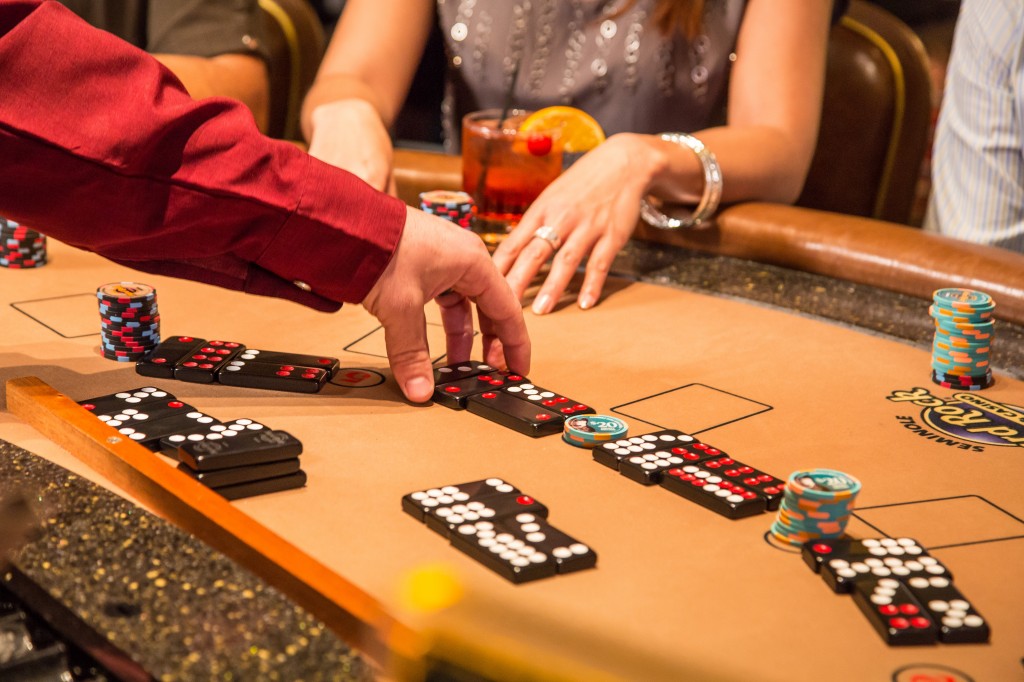Chinese Gambling Game With Dominoes Nyt – A Fascinating Cultural Tradition!
Pai Gow is a traditional Chinese gambling game using 32 dominoes, where players split tiles into high and low hands to compete against the dealer.
In this article, we will explore the Chinese gambling game with dominoes, its rules, history, and why it remains so popular today.
What is the Chinese Gambling Game with Dominoes?

The Chinese gambling game with dominoes is often known as Pai Gow. It is a traditional game that has been played for centuries. The game uses a set of 32 Chinese dominoes, which are different from the Western-style dominoes that most people are familiar with. These dominoes are made from materials such as bone or ivory, and each piece has a unique combination of dots.
In Pai Gow, the goal is to create two hands from the domino tiles: a high hand and a low hand. These two hands are compared against the hands of other players and the dealer. The game has elements of both skill and luck, making it exciting and competitive.
History of Pai Gow:
Pai Gow has a long and rich history in Chinese culture. It is believed to have been invented during the Song Dynasty (960–1279 AD). The game was originally played as a simple pastime, but over time, it evolved into a form of gambling. In the past, Pai Gow was mainly played by the wealthy and elite members of society, but today it is enjoyed by people of all classes and is played in both casinos and home settings.
One of the reasons Pai Gow became so popular is because it is easy to learn but challenging to master. The game’s history is deeply connected to Chinese gambling culture, where it became a staple in gambling houses and is now found in many casinos around the world.
How to Play the Chinese Gambling Game with Dominoes (Pai Gow):
- Objective & Setup: Split 7 dominoes into two hands: a low hand (2 dominoes) and a high hand (5 dominoes). Both hands must beat the dealer’s corresponding hands to win.
- Arranging the Hands: The low hand must be weaker than the high hand. Place strong doubles or sequences in the high hand and weaker dominoes in the low hand for strategic advantage.
- Ranking the Hands: Hands rank from strongest to weakest: Double 6, Wheel (1-2-3-4-5), straight sequences, pairs, and single dominoes, with single dominoes being the weakest.
- The Showdown: After arranging hands, players compare them to the dealer’s. Winning both hands beats the dealer. A tie occurs if one hand wins and the other loses, returning the bet.
- Betting & Payouts: Players place bets before the game starts. Winning both hands results in a 1:1 payout. Losing both hands means a loss. A tie returns the player’s bet.
Also read: Can Blastem Run Cd Games – A Comprehensive Guide!
Strategies for Playing Pai Gow:
While Pai Gow is a game that relies heavily on luck, there are still strategies that can increase a player’s chances of winning. Here are some useful tips:
Know the Combinations:
Understanding the various domino combinations is crucial in Pai Gow. Focus on creating the strongest high hand while ensuring the low hand is weaker, but not too weak to lose. Combinations like doubles, sequences, and pairs have different rankings, and you should prioritize placing high-value dominoes in the high hand. A well-arranged hand increases your chances of winning against the dealer’s hands, making it essential to master the domino rankings and hand arrangements for better strategy.
Use the “House Way” Strategy:
Many casinos have a predefined strategy known as the “House Way” that the dealer follows when setting their hands. This strategy helps guide the dealer’s decisions based on their dominoes. Some experienced players attempt to mimic the House Way to improve their own odds of success. By understanding this approach, players can set their hands similarly, giving them a strategic advantage. However, this method doesn’t guarantee success, as the game still relies on luck.
Don’t Overestimate Your Hands:

One of the most common mistakes in Pai Gow is overestimating the strength of your hands. While it’s important to aim for a strong high hand, remember that your low hand must also be competitive to avoid a loss. Don’t be tempted to place your strongest dominoes in the high hand at the expense of making your low hand too weak. Play conservatively when needed, ensuring your low hand has a good chance of beating the dealer’s hand.
Pay Attention to Other Players:
When playing Pai Gow with others, observe their strategies closely. Watching how fellow players arrange their hands can provide valuable insights into different approaches and hand divisions. By analyzing their tactics, you can learn new methods or avoid mistakes they make. Understanding how others play helps refine your own strategy, giving you a competitive edge. This observational strategy, combined with your knowledge of the game, can improve your decision-making and increase your chances of winning.
Other Chinese Domino Gambling Games:
While Pai Gow is by far the most popular, several other Chinese gambling games use dominoes. These games often have similar rules and objectives but vary in their betting structures and gameplay.
Chou Pai Gow (Chinese Dominoes):
Chou Pai Gow is a simplified version of Pai Gow, commonly played in casual settings. Like Pai Gow, it uses a set of 32 dominoes, but the gameplay is more relaxed. Players still aim to form two hands: a high hand (5 dominoes) and a low hand (2 dominoes). The player with the best combination wins, but the rules are simpler, and there’s less emphasis on strategic hand arrangement. It’s a great choice for casual players seeking a quicker game.
Dou Shou Qi (The Battle of the Generals):
Dou Shou Qi, also known as The Battle of the Generals, is a traditional Chinese game involving special domino-like tiles representing characters. Unlike Pai Gow, the objective is to capture the opponent’s “general” tile by strategically moving pieces across the board. The game emphasizes strategy, planning, and tactical thinking, offering a unique experience compared to other Chinese domino games. It’s well-suited for players who enjoy complex, thought-provoking games with deeper rules and competitive elements.
Also read: Cc25 Early Acces Game Pass Oc – A New Era Of Gaming!
The Cultural Significance of Gambling in China:
Gambling as a Social Activity:
In Chinese culture, gambling is not always viewed in a negative light. It is often seen as a form of socializing, entertainment, and even a way to bring good fortune. The tradition of gambling with dominoes dates back to ancient China, and it was often played during important festivals and family gatherings. During Chinese New Year, for instance, gambling games like Pai Gow and others are a common feature of family celebrations, bringing people together to enjoy a fun and exciting activity.
The Influence of Gambling on Chinese Arts and Literature:
The love for gambling with dominoes has had a significant impact on Chinese art, literature, and even popular culture. Throughout history, gambling has been depicted in paintings, poems, and stories. These depictions often show the excitement, fortune, and occasional misfortune that come with gambling. Famous authors and poets have written about the role of games and luck in Chinese society, further cementing gambling as an integral part of Chinese cultural expression.
FAQ’s
1. What is Pai Gow?
Pai Gow is a traditional Chinese gambling game using 32 dominoes. Players split the tiles into two hands, a high and low hand, and compete against the dealer.
2. How do you win in Pai Gow?
To win, players must have both their high and low hands beat the dealer’s corresponding hands. Winning both hands results in a payout, while losing both hands results in a loss.
3. What are the rules for setting hands in Pai Gow?
Players place stronger dominoes in the high hand (5 tiles) and weaker ones in the low hand (2 tiles). Proper hand arrangement is key to maximizing winning chances.
4. Are there any strategies for playing Pai Gow?
Yes, successful strategies involve understanding domino combinations, mimicking the “House Way,” and carefully observing other players to refine hand arrangement for a competitive advantage.
5. What are other Chinese domino gambling games?
Other Chinese domino games include Chou Pai Gow, a simplified version, and Dou Shou Qi, a more strategic game involving character tiles with unique movement and capture rules.
Conclusion
In conclusion, Pai Gow is a fascinating Chinese gambling game with a long history, blending skill and luck. Its appeal endures due to its strategic depth and exciting gameplay, making it a popular choice today. With its strong cultural ties and continuous evolution, Pai Gow remains a cherished part of traditional Chinese gambling practices and social gatherings.







